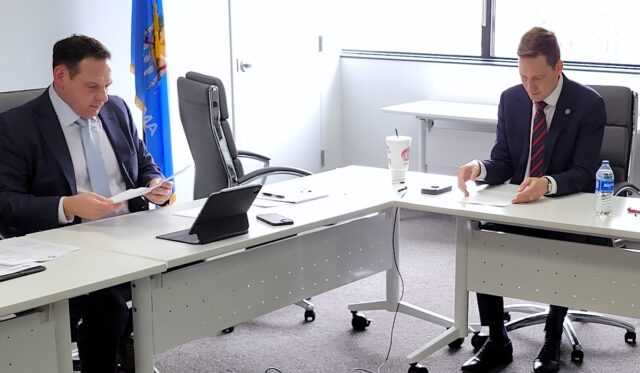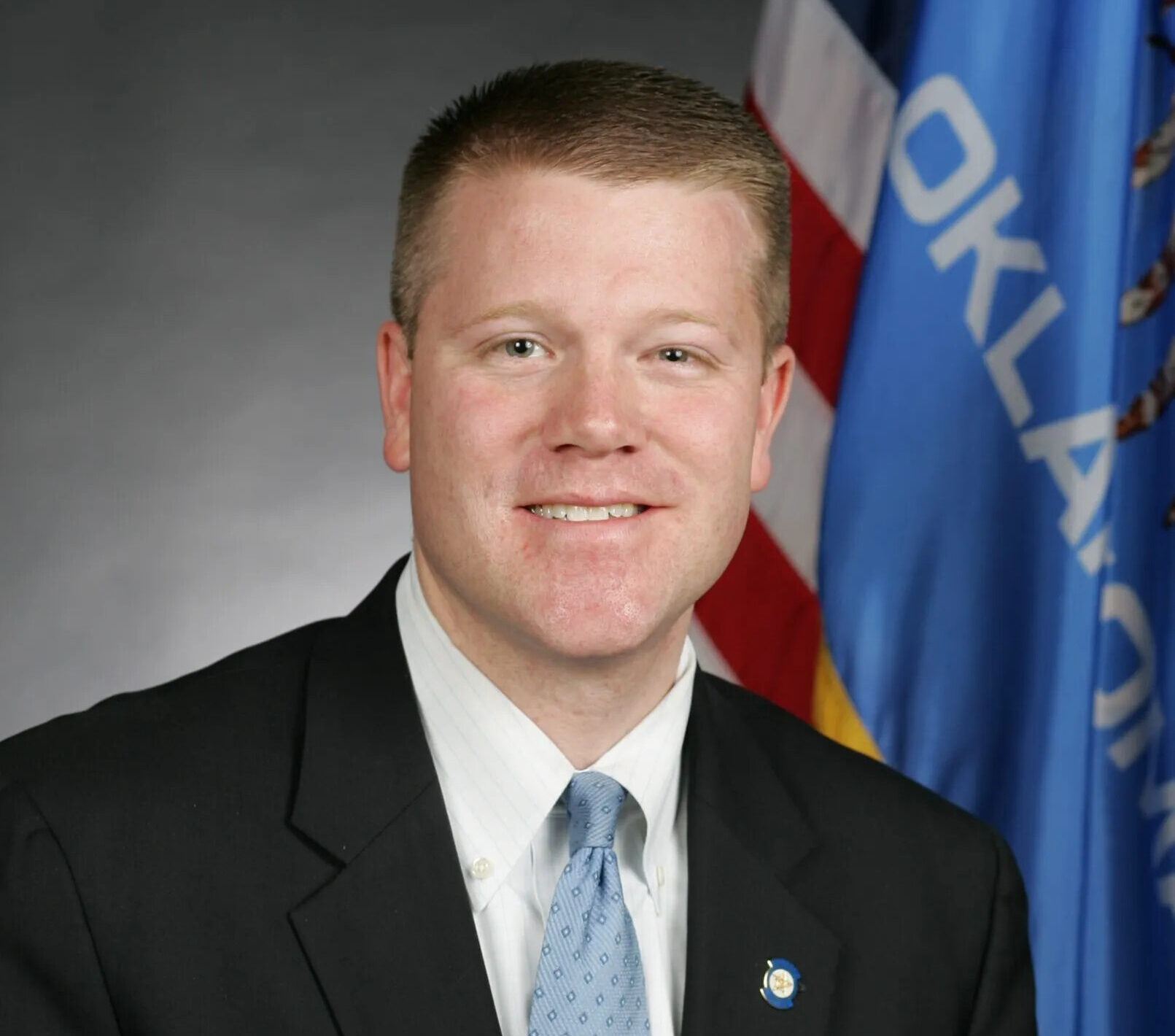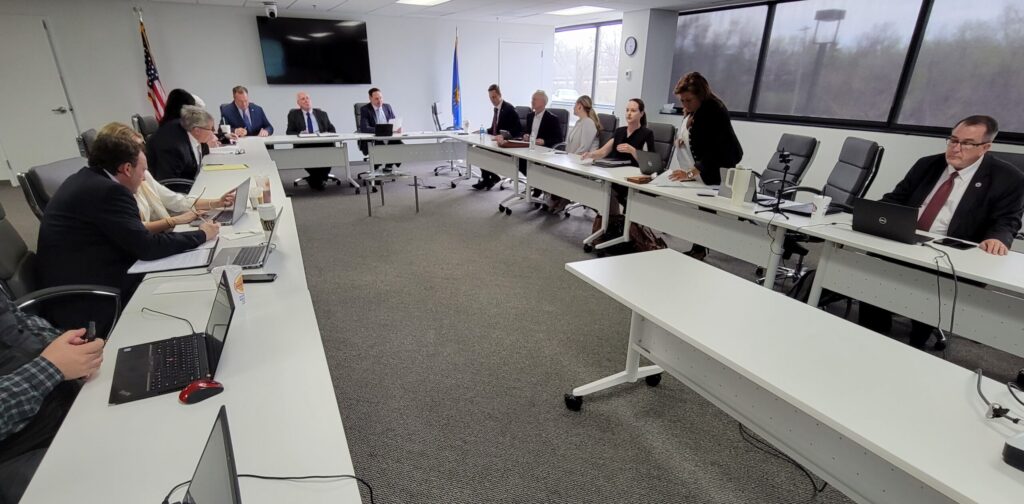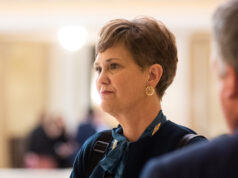

After an unusual series of events that included a vote to pursue hiring an out-of-state candidate, a voicemail from Gov. Kevin Stitt’s deputy chief of staff requesting a different result and the subsequent replacement of a prominent board member, the governing board of the Oklahoma Broadband Office selected former state Rep. Mike Sanders on Wednesday to be the first director of the agency, which has about $1.6 billion in federal money to deploy over the next five years.
Sanders became the preferred choice of Gov. Kevin Stitt, which was articulated to board members after they had met March 3 and voted 8-0 to pursue hiring a different man who currently serves as deputy director of a midwestern state’s broadband office.
The Oklahoma Broadband Governing Board met for the second time in less than three weeks on Wednesday to interview Sanders. After a 90-minute meeting, the board voted unanimously to offer Sanders the job.
Chairman Mike Fina told other board members and journalists that the March 3 board meeting minutes were unavailable, and the minutes’ approval was tabled until the March 31 meeting.
“Mike’s extensive work at the state House and his time serving in the George W. Bush administration give him the unique ability to understand this process and how to best navigate the complicated D.C., bureaucracy to make sure these federal dollars are distributed fairly and align with our vision to deliver high-speed internet access to 95 percent of the state by 2028,” Stitt said in a statement.
Sanders did not respond to a request for comment prior to the publication of this article.
The Broadband Governing Board is made up of nine members. Three are appointed by the governor, two are chosen by the speaker of the House of Representatives, and two are selected by the Senate president pro tempore. Lt. Gov. Matt Pinnell and State Treasurer Todd Russ also serve on the board, by statute.
After first vote, Roggow removed from board by Stitt
Duncan economic development leader Lyle Roggow had been appointed to the Broadband Office Governing Board by Stitt in June. But three days after making the March 3 motion to hire a midwestern state’s deputy director of broadband, Roggow found out that, with Stitt, it’s either the governor’s way or the highway.
Roggow, the director of the Duncan Area Economic Development Foundation for 16 years, was on the board’s search committee for the executive director, a process that began last fall. Four candidates were interviewed March 3, and Roggow said the candidate whom the board preferred that day had the most knowledge about broadband issues and the importance of making sure money was spent on getting broadband to underserved parts of a state.
“He did have the most knowledge about the subject matter,” Roggow said. “The remainder of the board felt that we had done our job as a committee to bring to them very high-level, qualified individuals who had knowledge, had CEO-type experience and understanding of the process.”
Three days after the March 3 meeting, Roggow received two calls from members of the Stitt administration. He said he did not recognize the first number and let it go to voicemail while he was at lunch. The second call came about three hours later from Stitt’s appointments director, who said the governor was removing him from the broadband board.
Roggow provided NonDoc with a copy of the voicemail he had received earlier that day. Stitt’s deputy chief of staff, former Republican state Rep. Josh Cockroft, asked Roggow to consider Sanders for the broadband post, even though Roggow and the rest of the board had selected another candidate three days prior.
A transcript of the voicemail reads:
Hey, Lyle, this is Josh Cockroft. It’s been a while since we’ve chatted. I’m Gov. Stitt’s deputy chief of staff now, and he asked me to reach out to you concerning the broadband office. Our understanding is that the board has interviewed someone from out of state (…) and he wanted to put, the governor wanted to put forward the name of Mike Sanders, former Rep. Mike Sanders, as a possible candidate for the director of the broadband office. Mike is willing to step in as the director. The governor has a great relationship with him and would love for him to serve in that role. So, he wanted me to reach out and see if there’s any possibility for getting the board to interview Mike Sanders for that position. So, if you can give me a call back at your earliest convenience, the number is (…). Look forward to talking with you and I appreciate it. Thank you, sir.
Roggow called fellow board members Fina and Pinnell to discuss Cockroft’s voicemail request and his subsequent removal from the Broadband Governing Board.
“They were shocked,” Roggow said, adding that neither appreciated Cockroft’s message suggesting the board consider Sanders for the post.
Asked Thursday about the voicemail he left on Roggow’s phone, Cockroft said he did not know whether Sanders had ultimately been selected for the job.
“The governor wanted a couple other candidates to be included, and the governor talked to the speaker and the pro tem that Mike be given a final offer,” Cockroft told NonDoc.
But Senate President Pro Tempore Greg Treat (R-OKC) said Cockroft’s claim was “not an accurate statement.”
“I don’t know if he’s just mistaken,” Treat said. “My two appointees and I were communicating. They were telling me that a gentleman from out of state was their top contender, and then things changed.
“There were a couple of names that were bandied about during that time that weren’t names that were originally part of the process.”
Treat said he does not recall talking about Sanders being considered for the OBO director post.
“The governor and I talk quite often,” Treat said. “I don’t ever recall having that conversation. We’ve talked about broadband, and we’ve talked about other names, but I don’t recall ever having a conversation about Mike Sanders with the administration.”
Treat called Sanders a “friend” who is respected at the Capitol.
“I really like Mike Sanders. I don’t know what his expertise on broadband is, but he is a good human being,” Treat said.
Treat said Stitt’s decision to replace Roggow with Amanda Mullins did not necessarily surprise him.
“He has not shown a hesitation to get rid of board members that serve at will,” Treat said. “That’s not the way I choose to exercise (my authority).”
A spokesman for House Speaker Charles McCall (R-Atoka) did not respond to questions about Cockroft’s claim that legislative leaders were asking for Sanders to be considered for the job.
Follow @NonDocMedia on:
‘There’s got to be integrity’
For his part, Roggow said he is not mad at the governor and that he likes Mike Sanders. But the longtime economic development advocate said he is frustrated with the process and the manner in which Sanders was selected.
“My beef isn’t with the governor,” he said. “It’s just that when we have these boards, you ask professional people to take time (…). They are acting in a professional manner and not being told how to think but are thinking on what is in the best interest of the taxpaying citizens of the state of Oklahoma.
“There’s got to be integrity.”
Today, the OBO sent NonDoc and The Frontier a press release saying Sanders had been hired as the agency’s executive director. The position has a salary range of $170,000 to $205,000, which will be considered at the next meeting of the governing board on March 31.
More than 40 people applied for the post, said Fina, who was appointed to the board by the governor. Fina said Stitt “had input throughout the whole thing.”
“It’s really not fair to say that he put one name in particular,” Fina said after Wednesday’s meeting. “He gave me several names throughout the process that he would be happy with as director of the broadband office.”
Fina, executive director of the Oklahoma Municipal League, said he never made an offer to the earlier front-runner. The main concern with that applicant was his lack of familiarity with Oklahoma.
“Because we have to work with so many entities like the tribes and municipalities, having familiarity with the state is very important, and that person did not have any familiarity,” Fina said.
But Roggow said the board had intended March 3 to hire the midwestern state’s deputy director.
“Everybody around the table knows that motion was made,” Roggow said. “Is that motion going to be hidden?”
Minutes lacking from board’s March 3 meeting

For those seeking the official record of the motion made by Roggow on March 3, none was available Wednesday.
The afternoon got off to a shaky start when board members were told minutes from the March 3 meeting were not ready for approval. Board members tabled the item until their next meeting on March 31.
“It is unusual. I can’t recall ever seeing that,” said Mark Thomas, executive vice president of the Oklahoma Press Association, who attended Wednesday’s meeting. “It shouldn’t happen again. Board members should sort of demand that they’re going to see the minutes to review what they approved at the prior meeting before they conduct more business.
“If I was on the board, I would basically say let’s stop the meeting until the minutes can be prepared.”
Tim Allen, director of policy and communications for the Oklahoma Broadband Office, said the agency has a staff of four people who are handling multiple duties.
NonDoc asked Pinnell about the March 3 board vote on March 9.
“The vote was to do due diligence on our top choices,” Pinnell said. “The motion was to do due diligence on the two finalists.”
Background on Mike Sanders

Sanders served six terms in the Oklahoma House beginning in 2008 until he was term-limited in 2020. He chaired the House Utilities Committee and Appropriations Subcommittee on Transportation, was vice-chairman of the Human Services Committee, and served as House majority leader.
Before being elected to the Legislature, Sanders worked in the White House for President George W. Bush. He also served in senior management in the U.S. Department of Agriculture in Rural Development and Natural Resource Conservation Service (NRCS). He earned his undergraduate degree in history and pre-law from Oklahoma Christian University and attended Georgetown University to work on a master’s degree in government. After leaving the Legislature, Sanders started his own business, Sanders Strategy and Consulting Group.
“I’m honored to be asked to serve in such an important role to benefit the people, businesses and economy of Oklahoma,” Sanders said in the OBO press release. “I have a servant’s heart to help improve the lives of Oklahoma families and communities, and I look forward to helping our state realize its full potential.”
In the release, Pinnell expressed his confidence in Sanders.
“Mike has the experience to lead the effort to bring high-speed internet to every corner of our state,” Pinnell said. “From his time with the USDA to serving on utility and transportation committees in the state House, he has the relevant background for this job. Just as important, Mike has a passion for and knowledge of Oklahoma that’s needed in this role. I trust him to make sure these dollars are invested fairly across the state. I look forward to working with him.”
Background on Oklahoma Broadband Office

The Oklahoma Broadband Office will administer about $1.6 billion in grant funds, with the goal of providing high-speed internet service to the vast majority of Oklahomans by June 2028, when the office will be closed. Of that funding, American Rescue Plan Act money has to be spent by the end of 2024.
The board and office were created in HB 3363, which was enacted last year. The nine-member board is responsible for broadband expansion policy and overseeing the broadband office.
The office has already begun operations with an interim director, Kirk Martin, selected by the board. Martin did not seek the permanent position.
The OBO, in addition to Martin, has three other employees. The governing board on Wednesday authorized Martin to hire an outreach coordinator for the agency. The OBO eventually will have about 20 employees.
The Legislature has allocated about $382 million of federal American Rescue Plan Act money to the OBO to fund various projects across the state. The OBO has received 139 broadband requests, which total about $4.3 billion.
(Correction: This article was updated at 7:25 p.m. Thursday, March 23, to correct the name of Kirk Martin and the salary range for the Oklahoma Broadband Office director position.)




















